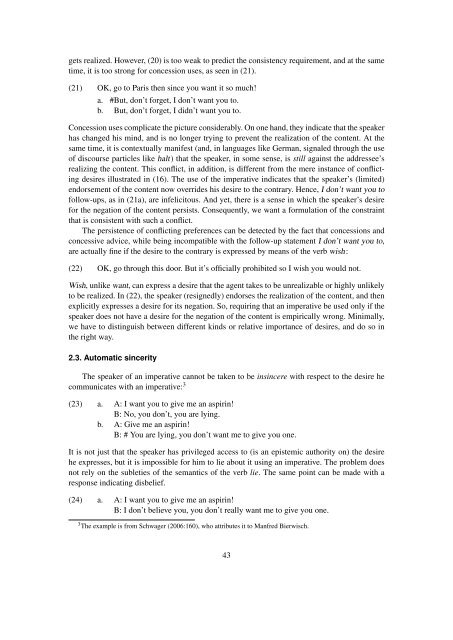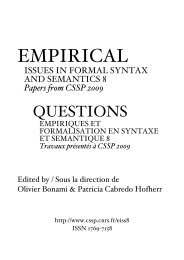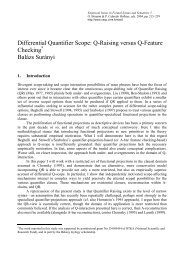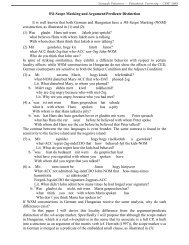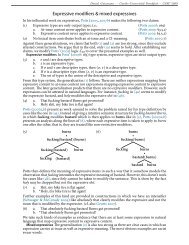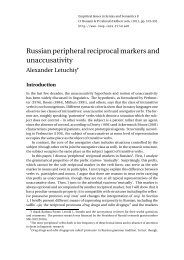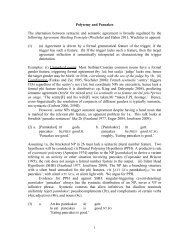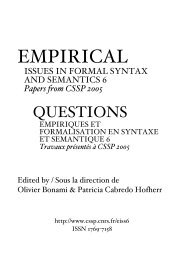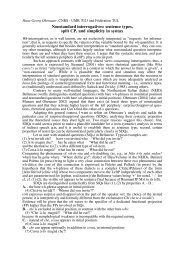Empirical Issues in Syntax and Semantics 9 (EISS 9 ... - CSSP - CNRS
Empirical Issues in Syntax and Semantics 9 (EISS 9 ... - CSSP - CNRS
Empirical Issues in Syntax and Semantics 9 (EISS 9 ... - CSSP - CNRS
You also want an ePaper? Increase the reach of your titles
YUMPU automatically turns print PDFs into web optimized ePapers that Google loves.
gets realized. However, (20) is too weak to predict the consistency requirement, <strong>and</strong> at the same<br />
time, it is too strong for concession uses, as seen <strong>in</strong> (21).<br />
(21) OK, go to Paris then s<strong>in</strong>ce you want it so much!<br />
a. #But, don’t forget, I don’t want you to.<br />
b. But, don’t forget, I didn’t want you to.<br />
Concession uses complicate the picture considerably. On one h<strong>and</strong>, they <strong>in</strong>dicate that the speaker<br />
has changed his m<strong>in</strong>d, <strong>and</strong> is no longer try<strong>in</strong>g to prevent the realization of the content. At the<br />
same time, it is contextually manifest (<strong>and</strong>, <strong>in</strong> languages like German, signaled through the use<br />
of discourse particles like halt) that the speaker, <strong>in</strong> some sense, is still aga<strong>in</strong>st the addressee’s<br />
realiz<strong>in</strong>g the content. This conflict, <strong>in</strong> addition, is different from the mere <strong>in</strong>stance of conflict<strong>in</strong>g<br />
desires illustrated <strong>in</strong> (16). The use of the imperative <strong>in</strong>dicates that the speaker’s (limited)<br />
endorsement of the content now overrides his desire to the contrary. Hence, I don’t want you to<br />
follow-ups, as <strong>in</strong> (21a), are <strong>in</strong>felicitous. And yet, there is a sense <strong>in</strong> which the speaker’s desire<br />
for the negation of the content persists. Consequently, we want a formulation of the constra<strong>in</strong>t<br />
that is consistent with such a conflict.<br />
The persistence of conflict<strong>in</strong>g preferences can be detected by the fact that concessions <strong>and</strong><br />
concessive advice, while be<strong>in</strong>g <strong>in</strong>compatible with the follow-up statement I don’t want you to,<br />
are actually f<strong>in</strong>e if the desire to the contrary is expressed by means of the verb wish:<br />
(22) OK, go through this door. But it’s officially prohibited so I wish you would not.<br />
Wish, unlike want, can express a desire that the agent takes to be unrealizable or highly unlikely<br />
to be realized. In (22), the speaker (resignedly) endorses the realization of the content, <strong>and</strong> then<br />
explicitly expresses a desire for its negation. So, requir<strong>in</strong>g that an imperative be used only if the<br />
speaker does not have a desire for the negation of the content is empirically wrong. M<strong>in</strong>imally,<br />
we have to dist<strong>in</strong>guish between different k<strong>in</strong>ds or relative importance of desires, <strong>and</strong> do so <strong>in</strong><br />
the right way.<br />
2.3. Automatic s<strong>in</strong>cerity<br />
The speaker of an imperative cannot be taken to be <strong>in</strong>s<strong>in</strong>cere with respect to the desire he<br />
communicates with an imperative: 3<br />
(23) a. A: I want you to give me an aspir<strong>in</strong>!<br />
B: No, you don’t, you are ly<strong>in</strong>g.<br />
b. A: Give me an aspir<strong>in</strong>!<br />
B: # You are ly<strong>in</strong>g, you don’t want me to give you one.<br />
It is not just that the speaker has privileged access to (is an epistemic authority on) the desire<br />
he expresses, but it is impossible for him to lie about it us<strong>in</strong>g an imperative. The problem does<br />
not rely on the subleties of the semantics of the verb lie. The same po<strong>in</strong>t can be made with a<br />
response <strong>in</strong>dicat<strong>in</strong>g disbelief.<br />
(24) a. A: I want you to give me an aspir<strong>in</strong>!<br />
B: I don’t believe you, you don’t really want me to give you one.<br />
3 The example is from Schwager (2006:160), who attributes it to Manfred Bierwisch.<br />
43


